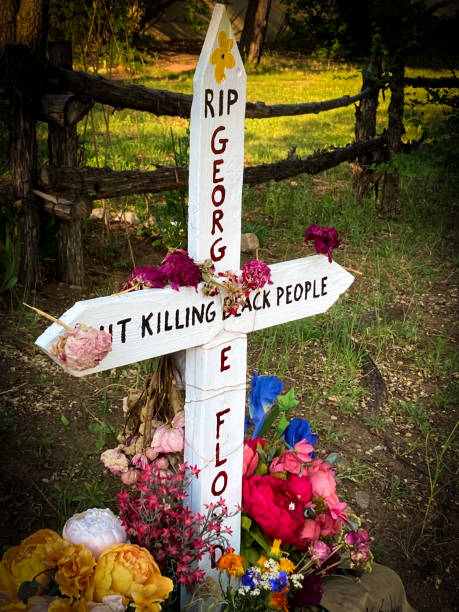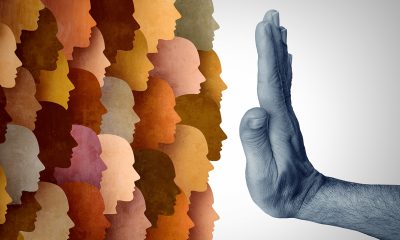Activism
When I See George Floyd, I See an Asian American
A modern-day lynching is specific and symbolic all at once. If you know Asian American history, then you know Asians in California, Chinese, and Filipino, were lynched in America.

You watching the trial of the now ex-Minneapolis Police officer Derek Chauvin, the person I call the “knee man?”
That’s what he was. Chauvin’s on trial for the murder of George Floyd, but I’m wondering how the defense is going to play this. Say that Chauvin’s knee acted independently?
The evidence is piling up. In Monday’s testimony, no less than the Minneapolis Chief of Police Medaria Arradondo said that Chauvin’s actions were in violation of “our principles and values that we have.”
In other words, the placing of the knee to the neck of Floyd, who was face down with hands cuffed behind his back, was “in no way, shape or form part of police policy or training.”
If you’re a juror and hear the chief come down on Chauvin, how can you possibly not find the officer guilty?
The defense has said it will focus on Floyd’s fentanyl drug use, presumably to link that as the real cause of death. But the prosecution on Monday brought out Dr. Bradford Langenfield, the Emergency Room doc who pronounced Floyd dead. He noted the length of time before Floyd got any breathing aid, and said Floyd’s death was more likely caused by asphyxia, or a lack of oxygen.
From the drugs or the knee?
The defense will claim it wasn’t the knee, which at times was also on Floyd’s shoulder. Is that enough reasonable doubt?
Remember it was when Chauvin’s knee was on Floyd’s neck, not when he was walking around with drugs in his system, when Floyd said, “I can’t breathe.”
So far, the trial’s most compelling moment came when Darnella Frazier, the teenager who took the cell phone video we all have seen, recalled her trauma at witnessing of Floyd’s death.
“When I look at George Floyd, I look at my dad, I look at my brothers, I look at my cousins, my uncles because they are all Black. I have a Black brother, I have Black friends. And I look at that and I look at how that could have been one of them,” Frazier said. “It’s been nights, I stayed up apologizing and apologizing to George Floyd for not doing more. And not physically interacting.”
Van Jones on CNN said Frazier had witnessed a lynching.
“When you have a lynching, which is what this was,” said Jones, “you aren’t just torturing the individual who you’re strangling to death, you’re torturing the whole community.”
A modern-day lynching is specific and symbolic all at once. If you know Asian American history, then you know Asians in California, Chinese, and Filipino, were lynched in America.
As my friend Ishmael Reed told me on my amok.com vlog, don’t let the media play “divide and conquer.” This isn’t a Black vs. Asian thing.
All BIPOC are fighting a common foe. All people of color have been under someone’s knee at some time in America. It’s our common ground, our shared past in America’s racist history.
That’s why to paraphrase Darnella Frazier, when I see George Floyd, I see an Asian American. And so should you.
Emil Guillermo is an award-winning Bay Area veteran journalist and commentator. See his vlog at www.amok.com
Activism
Oakland Post: Week of April 24 – 30, 2024
The printed Weekly Edition of the Oakland Post: Week of April 24 – 30, 2024

To enlarge your view of this issue, use the slider, magnifying glass icon or full page icon in the lower right corner of the browser window. ![]()
Activism
Oakland Post: Week of April 17 – 23, 2024
The printed Weekly Edition of the Oakland Post: Week of April 17 – 23, 2024

To enlarge your view of this issue, use the slider, magnifying glass icon or full page icon in the lower right corner of the browser window. ![]()
Activism
Oakland Schools Honor Fred Korematsu Day of Civil Liberties
Every Jan. 30, OUSD commemorates the legacy of Fred Korematsu, an Oakland native, a Castlemont High School graduate, and a national symbol of resistance, resilience, and justice. His defiant stand against racial injustice and his unwavering commitment to civil rights continue to inspire the local community and the nation. Tuesday was “Fred Korematsu Day of Civil Liberties and the Constitution” in the state of California and a growing number of states across the country.

By Post Staff
Every Jan. 30, OUSD commemorates the legacy of Fred Korematsu, an Oakland native, a Castlemont High School graduate, and a national symbol of resistance, resilience, and justice.
His defiant stand against racial injustice and his unwavering commitment to civil rights continue to inspire the local community and the nation. Tuesday was “Fred Korematsu Day of Civil Liberties and the Constitution” in the state of California and a growing number of states across the country.
One OUSD school is named in his honor: Fred T. Korematsu Discovery Academy (KDA) elementary in East Oakland.
Several years ago, founding KDA Principal Charles Wilson, in a video interview with anti-hate organization “Not In Our Town,” said, “We chose the name Fred Korematsu because we really felt like the attributes that he showed in his work are things that the children need to learn … that common people can stand up and make differences in a large number of people’s lives.”
Fred Korematsu was born in Oakland on Jan. 30, 1919. His parents ran a floral nursery business, and his upbringing in Oakland shaped his worldview. His belief in the importance of standing up for your rights and the rights of others, regardless of race or background, was the foundation for his activism against racial prejudice and for the rights of Japanese Americans during World War II.
At the start of the war, Korematsu was turned away from enlisting in the National Guard and the Coast Guard because of his race. He trained as a welder, working at the docks in Oakland, but was fired after the bombing of Pearl Harbor in 1941. Fear and prejudice led to federal Executive Order 9066, which forced more than 120,000 Japanese Americans out of their homes and neighborhoods and into remote internment camps.
The 23-year-old Korematsu resisted the order. He underwent cosmetic surgery and assumed a false identity, choosing freedom over unjust imprisonment. His later arrest and conviction sparked a legal battle that would challenge the foundation of civil liberties in America.
Korematsu’s fight culminated in the Supreme Court’s initial ruling against him in 1944. He spent years in a Utah internment camp with his family, followed by time living in Salt Lake City where he was dogged by racism.
In 1976, President Gerald Ford overturned Executive Order 9066. Seven years later, the 9th Circuit Court of Appeals in San Francisco vacated Korematsu’s conviction. He said in court, “I would like to see the government admit that they were wrong and do something about it so this will never happen again to any American citizen of any race, creed, or color.”
Korematsu’s dedication and determination established him as a national icon of civil rights and social justice. He advocated for justice with Rosa Parks. In 1998, President Bill Clinton gave him the Presidential Medal of Freedom saying, “In the long history of our country’s constant search for justice, some names of ordinary citizens stand for millions of souls … To that distinguished list, today we add the name of Fred Korematsu.”
After Sept. 11, 2001, Korematsu spoke out against hatred and discrimination, saying what happened to Japanese Americans should not happen to people of Middle Eastern descent.
Korematsu’s roots in Oakland and his education in OUSD are a source of great pride for the city, according to the school district. His most famous quote, which is on the Korematsu elementary school mural, is as relevant now as ever, “If you have the feeling that something is wrong, don’t be afraid to speak up.”
-

 Activism4 weeks ago
Activism4 weeks agoOakland Post: Week of March 27 – April 2, 2024
-

 #NNPA BlackPress4 weeks ago
#NNPA BlackPress4 weeks agoBeloved Actor and Activist Louis Cameron Gossett Jr. Dies at 87
-

 Community1 week ago
Community1 week agoFinancial Assistance Bill for Descendants of Enslaved Persons to Help Them Purchase, Own, or Maintain a Home
-

 Activism3 weeks ago
Activism3 weeks agoOakland Post: Week of April 3 – 6, 2024
-

 Business2 weeks ago
Business2 weeks agoV.P. Kamala Harris: Americans With Criminal Records Will Soon Be Eligible for SBA Loans
-

 Activism2 weeks ago
Activism2 weeks agoOakland Post: Week of April 10 – 16, 2024
-

 Community2 weeks ago
Community2 weeks agoAG Bonta Says Oakland School Leaders Should Comply with State Laws to Avoid ‘Disparate Harm’ When Closing or Merging Schools
-

 Community1 week ago
Community1 week agoOakland WNBA Player to be Inducted Into Hall of Fame





















































